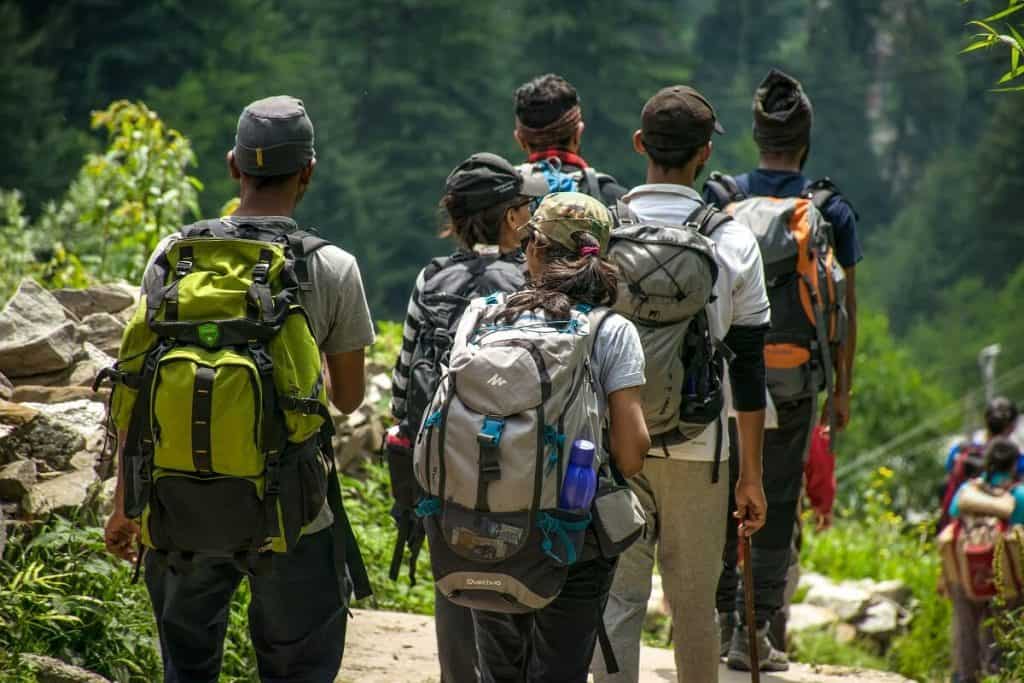If you are in a circle with friends who love to explore nature on foot one of the key discussion is hiking vs trekking. What is the difference between the two? Or are they just have the same but different name in different parts of the world for eg: football vs soccer. Let us clear the air for you.
Hiking and trekking are an act of vigorous walk in nature, uphill climb with fun activities. It has tremendous health benefits.
Hiking is a short walk to any place in nature, through a trail or human-made road. It usually takes place in a natural setting with beautiful scenery. It is a short day trip to escape from your daily routine.
Hiking ends at the same place where you start. You won’t need a lot of equipment while hiking as the hike ends within a day. You can also take your pets with you while going for a hike.
Hiking vs Trekking: Equipment
While on the other hand, trekking is also hiking but usually for more than a day. It is more challenging because it needs intense energy for multiple days in a row.
Most of the time, Trekking means walking in places where there is no access to transportation and needs proper organizing and planning. Trekking is also called backpacking in most of the are places.
Like hiking, trekking as well offers you a lot of benefits from physical fitness to mental well-being.
Furthermore, trekking will improve your sleep-wake cycle as trekking. If you’re having problems with your sleep, trekking is a must for you.
Staying overnight will get away from the internet and be in nature, which will recharge your energy. Being exposed to natural light, you’ll experience changes in your sleep pattern from the very first night outdoor.
Trekking will also help you enhance your softer skills like effective communication, coordination, adaptability to change, and emotional strength.
List of equipment you will need for hiking
- A bag
- Hiking Boots or shoes
- Water Bottle
- Energy bars
- First-Aid
- Navigation tools
- Raincoats (if you’re hiking in the rainy season)
- Suncream
- Hats or caps
- Sunglasses
- Matchsticks
List of equipment you will need for Trekking
- Map of the trekking area
- Navigation tools
- Sleeping bags
- Camps or Tents
- Matchsticks
- Head torch
- Hand knife
- Water bottles
- Water purifier
- Trekking boots
- Pair of clothes according to the climate
- Toilet papers
- Trekking Poles
- First-aid Kit
Hiking vs Trekking: Benefits
1. Mental well-being
More and more people are engaging in hiking these days, and there is a strong reason behind it. Apart from physical benefits, it also helps you boost your dopamine level and blissfully face everything that comes with your life.
You broaden your perspective, getting away from everyday monotony as you walk along the hiking trail encountering the magnificent landscapes and people from different communities and cultures.
The clean air and the experiences you will get from hiking will help you strengthen your core and heal yourself.
Your perspective indeed matters how you get through your life situations. A short hike can help you make more aware and urge you to question everything you thought of the world and reshape your life.
Leave everything behind for at least a day and enjoy nature as it is, and you’ll find the strength to fight modern society’s problems. Hiking is more soul surfing for most people and can get you to a peaceful state of mind.
2. Controlled blood pressure and cholesterol
With modernization at its peak, the city dwells us to work so intensely, sparing little time for ourselves, which has negatively impacted our health in many ways.
People have figured out an approach to reduce its impact naturally that can be adjusted within your hectic schedule.
The answer to all these health issues can be hiking. It can help you shape and fight these modern society issues effectively without spending a lot of money on gyms or medicines.
A hike per week or per month can significantly improve your health and physical state. Hiking offers you more than you seek to improve your health.
From controlled blood pressure to lower cholesterol, hiking tones your body as a whole. Moreover, hiking can reduce the risk of heart attack and effectively remove blood sugars, improving your glucose tolerance.
Everyone can surely make time for hiking at least a week or a month out of their daily routine and be in shape.
3. Helps in weight loss
If you’ve previously been stuck on getting out to your gym or do some exercise and lose your weight, hiking is the best solution for you.
According to Havard Health, a person burns over 1000 calories in a two-hour hike. Hiking burns more calories per hour and makes a significant contribution to weight loss.
Being with nature and leaving away everything that you know makes you more aware and conscious. The world is full of beautiful places and joyful experiences waiting for you. If you’re a beginner, start hiking; if you’ve hiked, start trekking and ultimately aim for the mountains, the laps of the sky. It is worthwhile to explore nature and learn to appreciate our life for what we have.
Hiking vs Trekking: Which one better suits you?
If you are a beginner, we recommend you start hiking as it is less intensive, and anyone with sound health can complete it. (Age group). However, if you have done some hikes and want to take your hike to the next level, you should go for a trek. Trekking will boost your mental, physical, and emotional status.
Hiking and Trekking can be enjoyable and rewarding as a whole. And apart from walking, either for a day or more than that, and you want more adventure, you should consider Mountaineering.
Mountaineering is more technical and challenging, offering you one of the best experiences of your life. Mountaineering is the activity where you summit a peak over 4000 meters above sea level.
For mountaineering, you must be well trained for using the tools and types of equipment used to summit the peaks. You need to be physically and mentally prepared for many challenges; for instance, mountaineers must learn how to ascend on the glacier with crampons or an ice ax or cross huge cracks safely.
Check out packages for Everest Base Camp Trek
There is a significant element of risk in mountaineering with the weather, making a huge impact. Enduring massive snowstorms while stepping on glaciers is not for all people.
For mountaineering, you need to be very careful with your tools and equipment.


